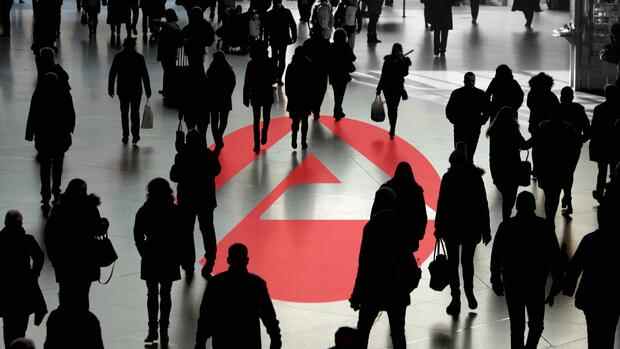Corona has driven up the expenditure of the Nuremberg authorities.
(Photo: imago images / Ralph Peters)
Berlin In 2020, unemployment in Germany caused costs of almost 62.8 billion euros – 22.4 percent more than in 2019, shows a study by the Institute for Employment Research (IAB). This interrupted a long-lasting downward trend, which is mainly due to the corona crisis.
The most important questions and answers about the cost of unemployment.
What is the composition of the costs of unemployment?
In 2020, the Federal Employment Agency (BA) counted an annual average of almost 2.7 million unemployed – around 430,000 more than a year earlier. The increase is mainly due to the corona crisis. Last year, including social security contributions, 35 billion euros were paid out to the unemployed.
Of this, contribution-financed unemployment benefit I accounted for 16.9 billion euros. Tax-financed unemployment benefit II, commonly known as Hartz IV, was spent 18.1 billion euros, including reimbursement for accommodation and heating.
Top jobs of the day
Find the best jobs now and
be notified by email.
In addition to the direct transfer payments, the reduced income in taxes and social contributions caused by unemployment add up. The IAB researchers put these shortfalls in public budgets at a good 27.7 billion euros for 2020. For the calculation, they assume an average income that the unemployed could theoretically earn if they were employed.
Who bears the cost of unemployment?
If the total costs of around 62.8 billion euros are distributed among the public budgets, the BA has raised 30 percent with its contribution money, which is the largest share. The federal government not only pays for the majority of Hartz IV benefits, it also misses out on reduced tax revenues. Overall, the federal government accounts for 28 percent of the cost of unemployment, and the federal states seven percent.
The municipalities, which in principle assume the costs of accommodation and heating for Hartz IV recipients and are supported by the federal government, bear a share of eleven percent. Pension, health and long-term care insurance make up a total of 24 percent of the total fiscal costs through loss of premiums.
How is the corona crisis affecting the cost of unemployment?
Compared to the previous year, the cost of unemployment rose by 11.5 billion euros or a good 22 percent in 2020. In terms of gross domestic product (GDP), they were 1.49 percent in 2019 and 1.88 percent last year.
Since 2009, the cost of unemployment in relation to economic output has always fallen; this downward trend has now been broken last year due to the corona.
Are the costs of unemployment high or low in a long-term comparison?
Even if the cost of unemployment rose in the past year, they were still significantly lower than at the beginning of the millennium. In 2004, a year before the Hartz IV reform came into force, they still accounted for 4.2 percent of economic output.
The subsequent recovery in the labor market lowered the cost of unemployment insurance in particular. In 2019 they were only around 40 percent of the level from 2005, but rose again to almost 60 percent last year.
What are the costs of preventing unemployment?
Active labor market policy aims to avoid unemployment and the need for assistance. It includes advisory services and qualification measures as well as short-time working allowances. Last year, according to the IAB, the record sum of 33.3 billion euros was spent on labor market policy, of which short-time working benefits alone accounted for 22.1 billion euros.
In the recession year of 2009, the BA spent only 5.2 billion euros on this. According to its own information, the federal agency has so far spent around 52 billion euros to deal with the corona crisis, of which 24 billion euros are accounted for by short-time work benefits, 18 billion euros for reimbursement of social contributions for short-time workers and ten billion euros for pandemic-related unemployment benefits.
More: Surprising final settlement – the employment agency retrospectively controls short-time allowance
